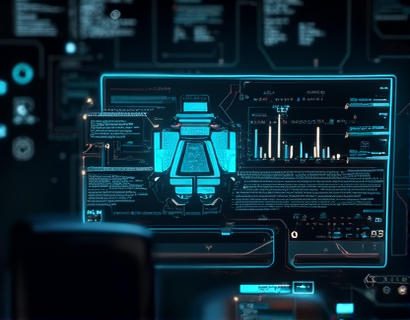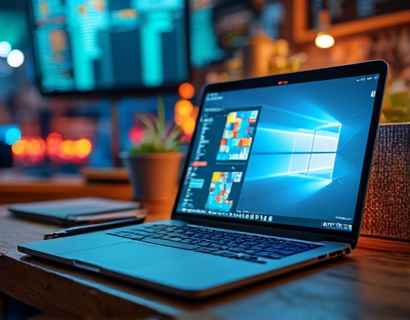Decentralized File Management: Revolutionizing Business Collaboration
In the digital age, efficient and secure file management has become a cornerstone for business collaboration and productivity. Traditional centralized file management systems often face challenges such as single points of failure, security vulnerabilities, and inefficiencies in access control. An innovative approach to addressing these issues is the adoption of decentralized file management solutions. These solutions offer a robust, secure, and efficient way to manage and share files, redefining the future of business collaboration.
Decentralized file management leverages blockchain technology and distributed networks to create a system where files are not stored in a single location but are instead distributed across multiple nodes. This approach eliminates the risk of data loss due to server failures and enhances security by reducing the attack surface. In this article, we will explore how decentralized file management can streamline business collaboration, ensuring secure and efficient access to critical information while boosting team efficiency.
Understanding Decentralization in File Management
Decentralization in file management means that data is not controlled by a single entity or stored in a central server. Instead, it is spread across a network of computers, each maintaining a copy of the data. This distributed architecture has several advantages. First, it enhances resilience as the system can continue to function even if some nodes fail. Second, it improves security by making it harder for attackers to compromise the entire system, as they would need to breach multiple nodes simultaneously. Lastly, decentralization promotes transparency and trust among collaborators, as all participants have equal access to the data.
The core principle behind decentralized file management is the use of peer-to-peer (P2P) networks. In a P2P network, each participant (node) can act as both a client and a server, sharing resources directly with other nodes without the need for a central authority. This direct sharing reduces latency and increases the speed of file access and transfer, which is particularly beneficial for teams working across different geographical locations.
Enhancing Security Through Decentralization
Security is a paramount concern for businesses handling sensitive information. Decentralized file management systems address this by implementing advanced cryptographic techniques and consensus mechanisms. Each file is encrypted and divided into fragments, with each fragment being stored on different nodes. To access a file, a user needs to gather and decrypt these fragments, ensuring that no single node holds the complete data.
Moreover, decentralized systems often employ blockchain technology to maintain an immutable record of all file transactions. This means that any attempt to alter or tamper with a file will be immediately detectable, providing an additional layer of security. The use of smart contracts can further automate and secure file access permissions, ensuring that only authorized users can view or modify specific files.
Streamlining Collaboration with Decentralized Solutions
One of the most significant benefits of decentralized file management is the enhancement of collaboration among team members. Traditional centralized systems often lead to bottlenecks and inefficiencies, as users must request access to files from a central administrator. In contrast, decentralized platforms allow team members to access and share files directly, without the need for intermediaries.
Decentralized platforms provide a user-friendly interface that simplifies the process of organizing and sharing files. Users can create, upload, and manage files with ease, and permissions can be set granularly to control who can view or edit each file. This level of control ensures that sensitive information is protected while still allowing for seamless collaboration.
Furthermore, decentralized platforms often integrate with other tools and services, such as project management software and communication platforms. This integration enables a more cohesive workflow, where file access and sharing are seamlessly tied to other business processes. For example, a team can upload a document to the decentralized storage and immediately share it with relevant stakeholders, all within the same interface.
Improving Efficiency and Productivity
The efficiency gains from adopting a decentralized file management system are substantial. By eliminating the need for central servers and reducing the overhead of managing access permissions, decentralized systems can significantly lower operational costs. Additionally, the reduced latency and faster file transfer speeds mean that team members can access the information they need more quickly, leading to faster decision-making and increased productivity.
Decentralized platforms also support version control and history tracking, allowing teams to easily revert to previous versions of files if necessary. This feature not only prevents data loss but also helps in maintaining the integrity of documents throughout the collaboration process. Automated backups and redundancy in the decentralized network further ensure that files are always safe and accessible.
Case Studies and Real-World Applications
Several businesses and organizations have successfully implemented decentralized file management solutions, achieving notable improvements in collaboration and security. For instance, a global software development team used a decentralized platform to manage their codebase and documentation. The team reported a 30% reduction in file access times and a significant decrease in the number of security breaches.
Another example is a multinational corporation that adopted a decentralized file management system to streamline its supply chain operations. By allowing suppliers and logistics partners to access and update shipment details in real-time, the company reduced delays and improved overall efficiency. The transparent and secure nature of the decentralized system built trust among all parties involved.
Challenges and Considerations
While the benefits of decentralized file management are clear, there are also challenges and considerations that businesses should be aware of. One of the primary concerns is the initial setup and integration with existing systems. Decentralized platforms may require technical expertise to implement correctly, and ensuring compatibility with current workflows can be a complex task.
Another consideration is the regulatory compliance, especially for industries handling highly sensitive data such as healthcare and finance. Decentralized systems must adhere to data protection regulations and ensure that user privacy is maintained. It is essential for organizations to work with providers who have a deep understanding of these regulations and can ensure compliance.
Scalability is also a factor to consider. As the number of users and files grows, the decentralized network must be able to handle increased load without compromising performance. Providers should demonstrate a proven track record of scaling their solutions to meet the needs of large organizations.
Future Trends in Decentralized File Management
The future of decentralized file management is promising, with ongoing advancements in blockchain technology and distributed computing. One trend is the integration of artificial intelligence (AI) and machine learning (ML) to enhance file organization and search capabilities. AI can help in automatically categorizing files, suggesting relevant documents, and even predicting user needs based on usage patterns.
Another area of development is the improvement of user interfaces and experiences. As decentralized platforms become more user-friendly, adoption rates are expected to increase, especially among smaller businesses and individual users who may not have extensive technical knowledge.
Interoperability between different decentralized systems is also on the horizon. Standardization efforts aim to create a more connected ecosystem where files and data can seamlessly move between different platforms, further enhancing collaboration and flexibility.
Conclusion
Decentralized file management represents a significant shift in how businesses approach collaboration and data management. By leveraging the power of blockchain and distributed networks, these solutions offer enhanced security, efficiency, and ease of use. As organizations continue to seek innovative ways to optimize their information management processes, decentralized platforms are poised to play a crucial role in the future of business collaboration.
Embracing decentralized file management is not just about adopting a new technology; it's about rethinking the fundamental principles of data handling and collaboration. For businesses and teams committed to staying ahead in a competitive landscape, decentralized solutions provide a robust and forward-thinking approach to managing critical information.











































